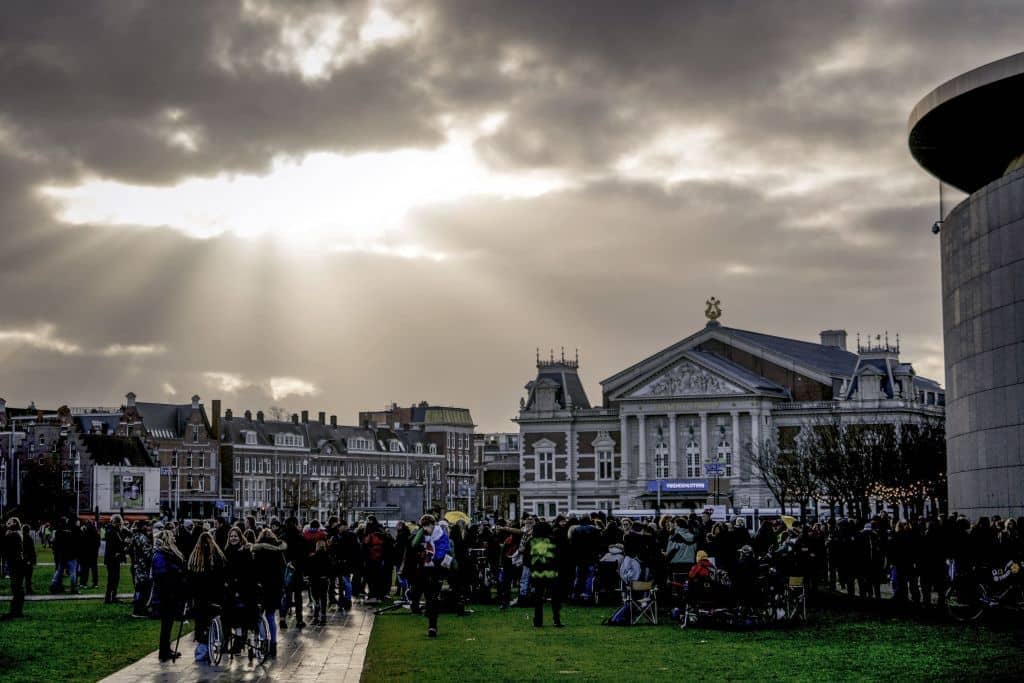On Wednesday at De Kleine Komedie, the oldest theatre in Amsterdam, the sound of comics on stage will be interspersed with the snips of scissors. Unable to open as a theatre due to the coronavirus restrictions, the comic actor Diederik Ebbinge
is defiantly converting the venue into a hairdressers for the day with customers able to watch live acts while they get their hair cut. Fellow comedian Sanne Wallis De Vries is asking theatres up and down the country to sign up and join their haircut theatre scheme on the same day.
In the latest phase of the Dutch lockdown, announced at a press conference on Friday night, from today gyms, shops and contact professions such as hairdressers are allowed to reopen until 5pm each day. The limited lifting of restrictions though now means you can go to a prostitute, but not to a concert hall. You can sweat at a gym, but not drown your sorrows at a bar stool with a jenever.
After being the only country in Europe to endure a month-long Christmas lockdown, the country’s mood is one of rage and rebellion. The head of the Dutch police union, Jan Struijs, expects a weekend of demonstrations and bars opening in defiance of the rules. Even groups of local mayors have said they won’t take enforcement action against businesses which ignore the measures.
Dutch politicians have made some woeful misjudgements in their management of the coronavirus pandemic. They threw the country open with far too little caution, and were then forced to yo-yo back into a stiff lockdown when infections spiked and intensive care units – with their relatively low capacity – were threatening to overrun.
After being the only country in Europe to endure a month-long Christmas lockdown, the country’s mood is one of rage and rebellion
It didn’t help that the government stood down over a domestic scandal in January 2021 and then it took 271 days after the elections in March to form a ‘new’ coalition (of the same four parties).
This Friday was the first coronavirus press conference given by the new government and health minister Ernst Kuipers, a former head of the national acute care network – who clearly has the medical expertise for the job. He has pledged that the Netherlands will ‘learn to live with the virus’ and create a long-term strategy.
But the roots of our current problems lie in September 2021 when, two days before the British NHS started its booster campaign, Dutch caretaker leaders cancelled the ‘one-and-a-half-metre-distanced-society’ and told people it was okay to discard their masks and hug again. At the time, the caretaker health minister Hugo De Jonge said confidently that ‘vaccine effectivity is high’ so the country wasn’t starting a booster campaign. Although the Netherlands had a high fully-vaccinated rate, this hubris – or was it malign incompetence? – led to Dutch hospitals overflowing with Delta patients before Omicron had even stepped up its march across the country.
So, alongside our Christmas cards – if the postman managed to deliver them – the largely vaccinated population of the Netherlands received an unwelcome gift: from December 19 food and drink, cultural venues, indoor sports and non-essential shops were all closed. Only essential shops and service providers were open, until 8pm each day. (This being the Netherlands, lawyers and notaries remained open so you could still try to take your government to court or buy a house.)
In the event, our hospitals did not run out of space, although one in ten staff are apparently off work after being infected. But the social effects have cut deep.
There has been a spike in suicides amongst people under 30. Two in three young people are suffering from loneliness, said the health minister.
Many thousands turned up to peacefully express their frustration in a banned demonstration in Amsterdam at the start of January. A few protesters apparently had violent intentions but the police’s response was also widely criticised after footage showed a protestor being mauled by a police dog.
Earlier this week it became clear that civil disobedience would escalate and the Dutch would no longer tolerate this harsh lockdown. One bar owner told the AD the country was ‘the laughing stock of Europe’ while other countries were open.
Even the Dutch national broadcaster is asking: was the December lockdown even necessary at all? Infections are currently just over 35,000 a day but there are under 400 people in intensive care (suggesting the relatively milder impact of Omicron). And why, asked political scientist Julia Wouters, are politicians loathe to acknowledge the role of the tardy booster campaign, or openly share the modelling that tells them that even the latest set of measures will result in 80,000 infections a day?
Still, one of the characteristics of Dutch society, a certain flexibility about rule-following, will probably act as a pressure valve for society in the end.
Throughout the lockdown, Dutch people have carried on shopping in German Cologne and Belgian Antwerp, or taken skiing holidays in Austria (bringing back infections with them). The new justice minister Dilan Yeşilgöz has suggested that it’s people’s own responsibility to follow the rules (rather than have police enforcement). Meanwhile, according to Struijs, police will only step in against ‘excesses’ at any demonstrations this weekend.
Even prime minister Mark Rutte did a merry dance to justify bars opening for a day or two, despite the ban. He told the press conference on Friday night: ‘I trust our mayors, there is also a right to demonstrate, and if they occasionally, for a little while, give some room for this demonstration valve…that is for mayors themselves to handle.’
Meanwhile, De Kleine Komedie’s temporary hairdressing salon and comedy line-up has reminded me, like many Dutch people, that I really need a haircut.






Comments